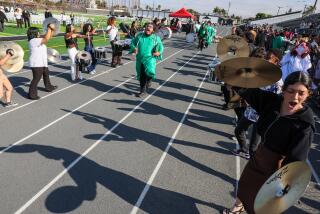Jazz Review : Veterans Touch Tomorrow at Student Concert
- Share via
SANTA ANA — Jazz is an art form best learned through experience, suggested Rancho Santiago College Jazz Band director David Lopez at the beginning of the school’s spring concert Sunday.
And there were more than a few lessons to be learned as veteran trombonist George Bohanon and trumpeter Oscar Brashear joined various student ensembles during a revealing, 2 1/2-hour program that said as much about the future of jazz as it did about the music’s past.
In front of an audience sprinkled with jazz history students taking notes on the performances, Bohanon and Brashear provided plenty of opportunity to compare and contrast their abilities with those of the students with whom they shared the stage.
Surprisingly, the students held their own, both in rhythm-section support and in their own solos. If those solos were not as polished as the pros’, they did show flashes of technique and, occasionally, a bit of musical personality.
Anyway, it would be way too much to expect the students to equal the play of the big guys who have mountains of experience to mine. Bohanon has worked with the best. An instrumental member of drummer Chico Hamilton’s quintet in the early ‘60s, he has worked for Lionel Hampton, Sonny Rollins, Benny Carter, Sarah Vaughn and Stan Getz. He’s also one of L.A.’s top studio trombonists.
Brashear, a veteran of the bands of Count Basie, Joe Henderson and Bobby Hutcherson, spent years in his native Chicago as a member of the Apartment Club’s house band, where he had occasion to play next to such great saxophonists as Dexter Gordon, Gene Ammons, Sonny Stitt and James Moody. There isn’t a music school on the planet supplying that kind of experience.
*
But Sunday’s concert offered just what aspiring musicians need most: a chance to hear and play with artists who have paid their dues. While the students may have been too involved reading charts and counting measures while playing to observe the guest artists, the concert provided that opportunity at its close as Bohanon, Brashear, saxophonist Lopez, bassist Ernie Nunez and drummer Elias Toscano displayed their wares on three of the jazz world’s most familiar standards.
Brashear, who’d added crackling excitement to the student numbers he participated in, displayed a beautiful lyric sense as he soloed on “Stella by Starlight.” His rotating flurries of notes seemed to extend that lyricism rather than interrupt it, and he concluded with a warm, intimate passage that suggested a child being slipped gently into bed.
Bohanon developed his solo in rich, mellow tones while playing without the bluster often associated with his instrument. His introduction to “Here’s That Rainy Day” found him using the trombone’s burnished tones to glowing effect as he employed the slide’s ability to subtly vary pitch.
Director Lopez, who played saxophones in various salsa, blues and rock bands as well as a chamber quartet in Tucson before coming to Rancho Santiago, acquitted himself well on tenor, showing a bit of Wayne Shorter’s tone and playing with a reserved passion that had his students cheering.
The 17-piece RSC jazz band opened the show with Brashear and Bohanon joining in on selections from Bob Mintzer, Toshiko Akiyoshi and Frank Rosolino. Standout efforts included those from pianist Elliott Baribeault, guitarist William Burke and saxophonist Dylan Morris, who soloed on baritone during Akiyoshi’s “Lazy Day.”
*
The 11-voice jazz vocal ensemble was pleasantly harmonious on Irving Berlin’s “Blue Skies,” framing a robust improvisation from Bohanon. Smaller combo settings, with director Lopez playing sax, illustrated how difficult it is to make jazz rhythms move with grace and consistency.
One of the evening’s most telling lessons came during the big-band’s performance. With one of his regular trumpeters unable to attend, Lopez enlisted onetime Poncho Sanchez trumpeter Sal Cracchiolo. Cracchiolo’s hot, high-end sound provided assertive contrast to Brashear’s warmly proficient ways.
The comparison between the two underlined the importance of personality and developing a recognizable voice as a player, something the members of the RSC jazz program showed they are well on their way to doing.
More to Read
The biggest entertainment stories
Get our big stories about Hollywood, film, television, music, arts, culture and more right in your inbox as soon as they publish.
You may occasionally receive promotional content from the Los Angeles Times.








